Disclaimer: This guide is not government-affiliated. Information provided as-is without warranty of accuracy. Contact your local housing authority to verify current information. | Last Updated: September 24, 2025
You already know the Section 8 game in Florida is rigged, but what you don’t know is exactly how people are actually getting through the door in 2025—hint: it’s stuff the government sites never mention. I spent months buried in waitlists, loopholes, and dead-end calls, and I cracked the code on the moves that get you bumped up the list and noticed by the right people. If you want the real playbook—not another dead-end resource list—keep reading and get your shot before someone else snags it.
Critical Legal Info for Florida
In Florida, housing law is a patchwork quilt—your rights depend on your zip code.
State law doesn’t protect voucher holders, but in Broward County, Miami-Dade County, and Hillsborough County, landlords must accept vouchers. Elsewhere, refusal is legal. Save all communications and ads in case of unfair treatment.
You’re Looking for Affordable Housing in Florida—Here’s Why That Matters
Look, nobody shows up reading about Section 8 in Florida in 2025 because their life is going great. You’re probably staring at an eviction notice, or your rent just shot up again—meanwhile your paycheck’s stuck in 2022. Or maybe you got wiped out by medical bills, or your car died and that dominoed everything. Whatever the reason, you wouldn’t be here if you had other options.
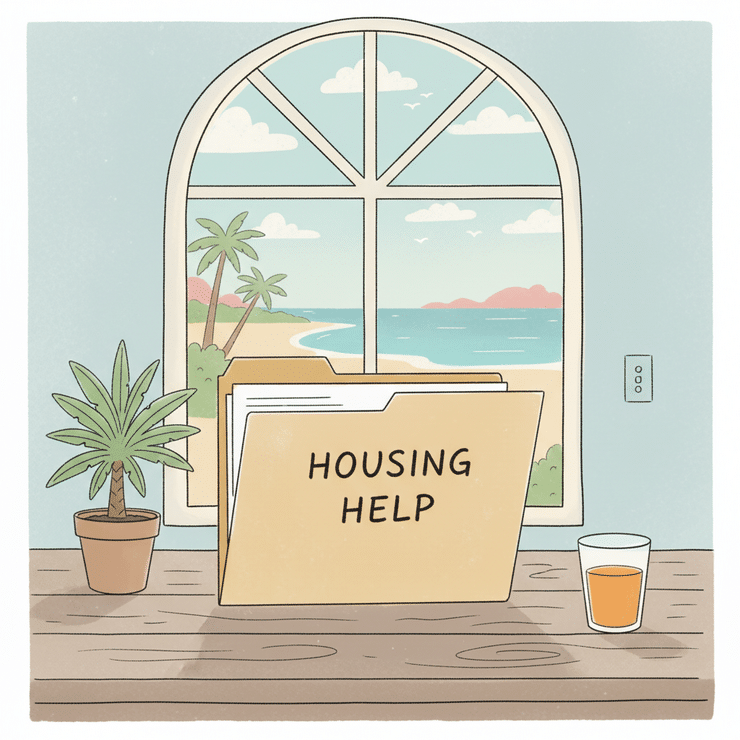
Let’s be real: the feeling that the whole system is designed to break you? That’s not paranoia, that’s experience talking. If you’re lying awake at 2AM, scrolling your phone and wondering which bill you can skip this month without getting kicked out, you’re not alone. The stress? The shame? That’s part of the trap. And anyone who says “just budget better” or “try harder” has never had to call a housing office more than once.
So here’s the truth nobody tells you: This isn’t going to be some sugar-coated, one-size-fits-all “resource list.” I’m not here to make you feel better. I’m here to show you exactly how people actually get through this mess—what lists you need to stalk like it’s your second job, how to work emergency preferences (the secret weapon if you know how to use them), and what the housing authority staff won’t tell you unless you catch them off-guard in the hallway.
Bottom line: you don’t have time for wishful thinking or the runaround. This is the playbook. No BS. Let’s get into how the system really works—and how you can twist its arm back.
Section 8 Is Available in Every County in Florida
Let’s kill this myth right now: Section 8 is everywhere in Florida. I don’t care if you live in the middle of nowhere or smack in the middle of Miami—there’s a housing authority for you. And I mean all 67 counties, zero exceptions.
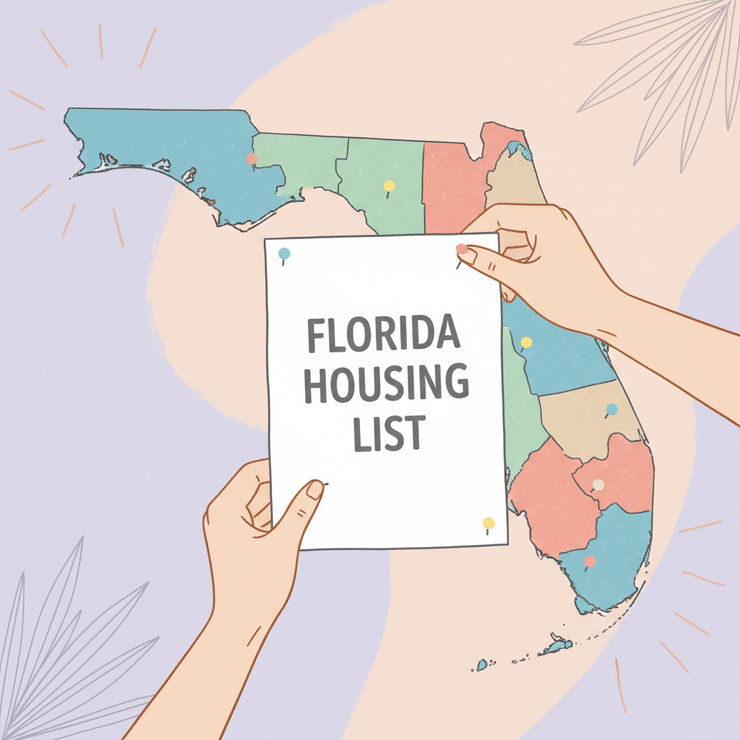
Miami-Dade • Broward • Palm Beach • Hillsborough • Orange • Duval • Pinellas • Lee • Polk • Brevard • Pasco • Volusia • Seminole • Sarasota • Manatee • Osceola • Lake • Marion • Collier • St. Lucie • Escambia • St. Johns • Leon • Alachua • Clay
(and that’s not even all—there are 67, seriously, look up your county if it’s not here)
Here’s what actually happens: Housing authorities love to play musical chairs with their coverage areas. One agency might handle two or three counties, or shuffle people between lists depending on who’s got funding. You do NOT have to live in a county to apply for its Section 8 list. If County B’s waitlist is open and yours is closed, you jump on County B’s list—period. That’s how people really get in.
Don’t let your address box you in. Cast a wide net—every list within 100 miles is fair game. I’m talking real hustle: check every single housing authority, even if it means driving a bit farther later. These lists open and slam shut with zero warning—today’s dead end could be tomorrow’s open door. You want options when the phone finally rings.
The truth nobody tells you: Waitlists are savage. In some places, you’re looking at YEARS. Some run lotteries, so it’s literally luck of the draw even if you’ve been waiting. And the rules? They change them up whenever they feel like it—one month it’s points for being local, next month it’s random. Don’t get caught with your name in just one hat.
And if you’re near the Georgia or Alabama border? Don’t sleep on the next state. Sometimes their lists are shorter, and you don’t need to be a resident to apply. Widen your search, even if it feels like you’re grasping at straws. The game is rigged, but the only way to win is to play everywhere you can.
What Section 8 Housing Really Means in Florida
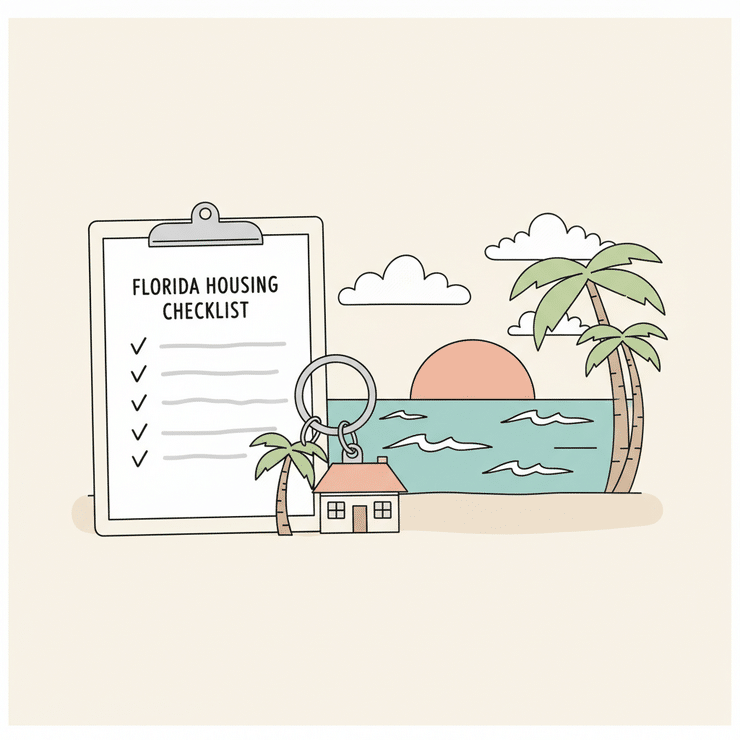
Here’s what actually happens: Section 8, officially called the Housing Choice Voucher program, is not free rent—don’t let anyone tell you otherwise. The truth nobody tells you: you’ll still be paying a chunk of the rent every month. The government just covers the rest, IF you can find a landlord who’ll actually take the voucher (spoiler: not all of them do, and a lot will flat-out say no).
You’re not off the hook just because you have a voucher. You still go through the normal hoops: background check, credit report, maybe even interviews. If you’ve got an eviction, bad credit, or a criminal record, landlords can and will use that to deny you, voucher or not. The housing authority doesn’t care about your rental history, but the landlord definitely does. You need some sort of steady income—Section 8 is for very low-income households, but that doesn’t mean “no-income.”
Here’s the kicker: in Florida, there are thousands of people chasing every single open spot. The competition is brutal, and you’re up against single moms, seniors, disabled folks, and families who have been on waitlists for years. Don’t let anyone sugarcoat it: you’re in a race, and it’s packed.
What Florida Section 8 Applicants Are Facing in 2025
The numbers don’t lie and they’re ugly: more than 400,000 people in Florida already live in subsidized housing. Want to know the real odds? Only about one in four people who qualify actually get any help. Why? Because the program is chronically underfunded—there’s just not enough money to go around.
Average wait time? 30 months. That’s two and a half YEARS, and it’s actually longer than the national average. So if you’re thinking you’ll get help in a couple months, wake up—it’s 2-3 years minimum in most counties, and longer if you don’t have “priority status” (think: homeless, fleeing domestic violence, or disabled). If you’re not one of those, buckle up for the long haul.
Eligibility isn’t just a buzzword. 91% of voucher holders are considered very low-income, and 70% are extremely low-income. If you can barely keep the lights on, join the club—so can most people on these lists. The line isn’t short, and everyone’s desperate.
Florida Section 8 Myths You Need to Stop Believing
- “First come, first served” is straight up a lie. Most waitlists in Florida aren’t even first-come—they’re lottery-based. Your spot is luck of the draw. You can’t hack the system, but you can boost your odds by getting on every single list you can find. More lists = more chances.
- Voucher ≠ automatic apartment. Just because you get a voucher doesn’t mean the keys are yours. Some landlords don’t accept vouchers at all (and in Florida, they’re allowed to say no). Even the ones who do will still run background and credit checks. If you’ve got things in your past, expect to get denied sometimes. That’s just how it goes.
- One denial isn’t the end. Don’t let a single “no” knock you out. Apply everywhere. If a housing authority turns you down, move straight on to the next one. No one keeps score except you—so stack up those applications.
The bottom line: the system is slow, underfunded, and way more competitive than anyone admits. Yeah, it’s messed up, but here’s how to deal: know what’s real, get on every list, and don’t expect miracles.
Florida Section 8 Application Steps That Actually Work
Alright, this is not the time to freeze up or wish for miracles. Section 8 in Florida is a grind, and nobody’s going to hand you a golden ticket. Here’s what actually works:
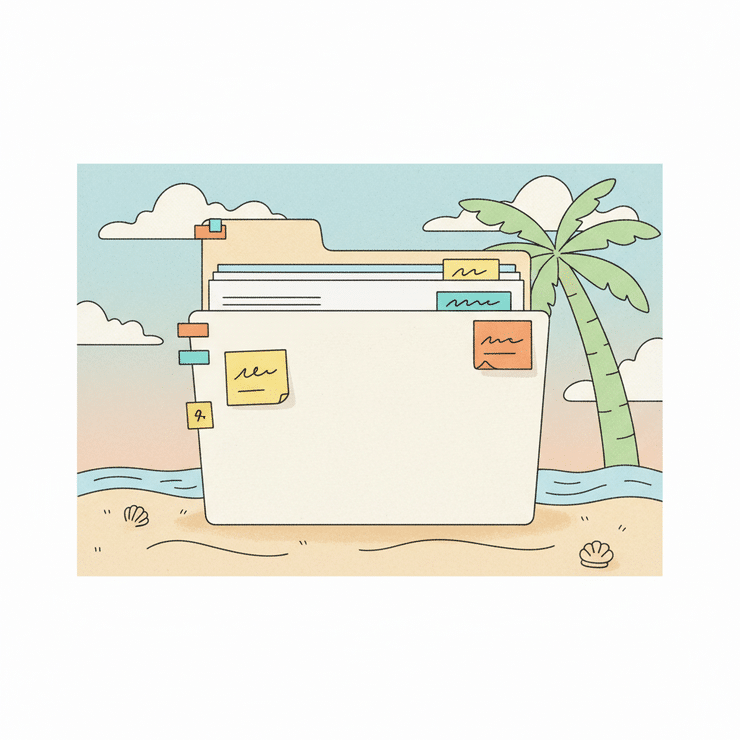
- First move: Google “[your county] housing authority” and “[neighboring county] housing authority.” Don’t just stop at your city—map out every single housing authority within a 50-mile radius. Open a Google Map, start dropping pins. Do this TODAY, not tomorrow. If you wait, you’re already behind everyone else who’s about to lose their place. And heads up: half the sites you’ll find are ancient and broken. Keep digging until you find an actual authority—not a listing site or some third-party “help” page.
- Documents you NEED to have ready: Don’t even think about putting your name on a list until you’ve got these in a folder—physical AND scanned as PDFs. Birth certificates for everyone in the household, social security cards, your last 3 pay stubs (or proof of zero income), bank statements (all accounts), your current lease, and any medical documentation that could bump you into a priority slot (think: disability paperwork, doctor’s notes on chronic illness, anything official). The truth nobody tells you: If you’re missing even one paper, you’re out. Period.
- Make a tracking spreadsheet. Don’t roll your eyes—this is what separates people who get through the system from people who get lost in it for YEARS. You want columns for: Authority Name, List Status (open/closed/waiting), Date Applied, Login Info (usernames, passwords—yes, it matters), Next Check Date. Every time you call or apply, update the sheet. People lose their spot all the time because they can’t remember who they talked to or when. Don’t be that person.
- Exact script for calling: Don’t overshare. Don’t give them your life story. You say, “Hi, I need to know if your Section 8 list is open and when the next opening might be.” That’s it. If you start talking about your eviction or family or crying, you’ll get transferred, stuck on hold, or told to “check the website.” Stick to the facts, get the info, hang up.
- When a list opens, the online portal WILL crash. Not maybe—every time. This is Hunger Games. Set alarms for the minute the list opens. Have every document scanned, labeled, and ready to upload in seconds. If you’re fiddling with your printer or waiting for files to email from your phone, someone else just took your spot. And for the love of God, use good Wi-Fi—not the neighbor’s, not a coffee shop’s.
- Once you’re on a list, your job isn’t over. Follow up every 30 days. Not 29 (don’t be a pest), not 31 (don’t get forgotten). Put a recurring reminder in your phone: “Just checking my status.” That’s all you say. If you let them forget about you, they will. People wait years because they didn’t check in and their file got “lost.” Don’t give them that chance.
Yeah, it’s messed up, but this is how you survive the system—and actually get your shot at housing.
How to Find Florida Housing Resources That Actually Help
Here’s what actually happens: if you just type “Section 8 Florida” and hope for the best, you’ll drown in garbage websites and outdated info. Don’t play yourself. Google these phrases, word for word, and copy-paste them with your county or zip code swapped in:
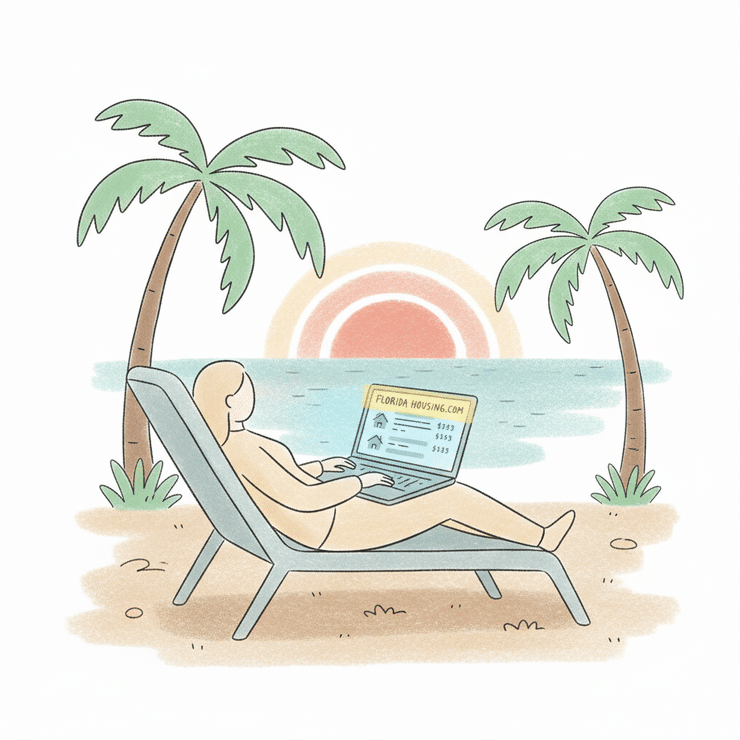
- “[county] housing authority waiting list”
- “Florida Section 8 application”
- “affordable housing [zip code]”
No cute synonyms, no guessing—exact phrases. The truth nobody tells you: every housing authority tries to bury the actual waitlist link under layers of junk. Outdated PDFs, broken links, fake “partner” sites—they want you lost. So skip the homepage. Scroll straight to the “News,” “Announcements,” or “Public Notices” tabs. That’s where they drop the bombshells—like “waitlist opening Tuesday for 2 hours”—with zero warning and zero help. Refresh those pages like your rent depends on it. Because it does.
Yeah, it’s messed up, but you need backup. Join Facebook groups like “[City] Housing Authority Updates”, “Section 8 Florida”, and “[County] Affordable Housing” right now. Turn on ALL notifications. These groups move faster than the official sites. Someone always hears about a list opening before it hits the website. When you see a post—jump. The window is usually hours, not days.
Not all nonprofits are worth your time. Some will feed you lines and send you to other agencies in a never-ending circle. The only ones that matter are the ones posting real-time opening alerts and offering to help with applications. If they just hand you a brochure, bounce. If they offer to call the housing authority with you, or review your paperwork for free—stick with them. Trust your gut: if they sound robot-y or overwhelmed, move on.
Critical warning: If you’re in crisis—homeless, getting evicted, escaping domestic violence, disabled, or have family reunification needs—there are legal fast tracks. But (here’s what they won’t tell you) you have to ask directly for “emergency preference” or “priority status.” Don’t assume they’ll offer. Show up with your proof ready: eviction notice, police report, disability paperwork, whatever applies. Push for them to note your file for those preferences. These can literally bump you up years on the waitlist, but only if you demand it and have the documents in their face.
Bottom line: Don’t wait for someone to call you. Stalk the sites, flood the groups, ask for every shortcut, and never take “just check back later” as an answer. This is how people actually get Section 8 in Florida.
What to Expect From Florida Section 8—The Good, Bad, and Ugly
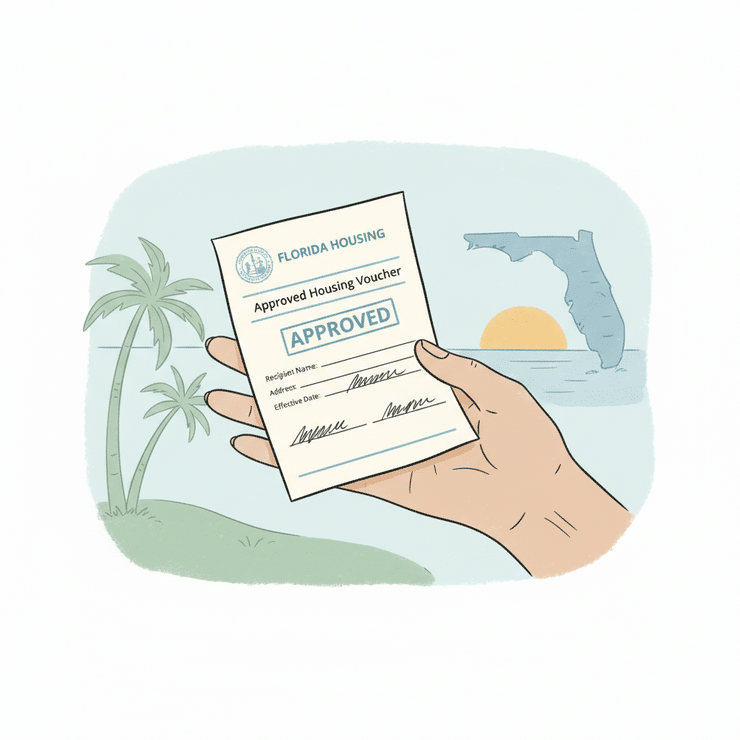
The Good
If you get a voucher, that’s a game-changer. Your rent drops to something you can actually handle. Suddenly you’ve got money left over for food, meds, or just breathing room—stuff that felt impossible before. Don’t let anyone tell you it isn’t worth it. For some people, this is the only lifeline that actually works.
There are places where the wait isn’t as soul-crushing. Some counties move faster, and a few have special priority lists (think: disabilities, seniors, maybe disaster displacement). It’s not fair, but sometimes being in the right spot at the right time really matters. If your situation is urgent, ask straight up about preferences—don’t wait for them to bring it up, they probably won’t.
And here’s what nobody at the housing office will ever admit: Real tips come from other people in your shoes. Facebook groups and forums are full of folks trading info that actually matters—like which landlords don’t play games with vouchers, or which offices actually pick up the phone. Get in there and ask. You’ll learn more in one night scrolling than from a week of calling clueless caseworkers.
The Bad
You want the truth? The wait is brutal. Average is 30 months—but that’s just the middle. Miami, Orlando, Tampa? Could be longer. There is no secret fast pass unless you fit their narrow emergency boxes (and even then, it’s paperwork hell). If they say the list is open, apply immediately. If they say it’s closed, set an alarm to check every single week.
Having a voucher doesn’t mean you’re golden. Landlords can (and do) say no. They’ll check your credit, your record, your rental history. You might finally get your golden ticket and still spend months hunting for anyone who’ll actually take it. Don’t quit at the first “no.” It’s a grind, and you’ll need to call, email, and show up in person—over and over.
Nobody tells you how confusing the system is—on purpose, honestly. Housing offices are stretched thin and half the time, they just don’t care. Lost paperwork? Happens all the time. You’ll get dead-end voicemail loops, emails that bounce, and the classic “call back next month.” Don’t trust anyone to follow up for you. Make copies of everything, keep notes on who you talked to, and never, ever leave the office without a date and name for your next step.
The Ugly
Here’s the part they really don’t want you to know: Some people wait years and still get nothing. That’s not rare—it’s the norm. Only about 1 in 4 eligible households in Florida gets help. Most waitlists close with zero warning and sometimes only reopen for a few hours—if you’re not watching like a hawk, you miss it and you’re out for another year or two.
Landlord discrimination? It’s real. Some just say “we don’t take Section 8,” others will smile and then ghost you, or invent some BS reason to turn you away. It’s illegal in some places, but good luck getting anyone to enforce it. Keep pushing. For every ten who slam the door, one will let you in.
The emotional toll is no joke. You will feel like giving up—everyone does. That’s how the system beats people. Don’t let it. It’s a numbers game, and the only way through is to keep applying, keep following up, keep showing up, no matter how many times they tell you “no.”
Yeah, it’s messed up. But knowing what you’re in for means you can actually play the game—and maybe, finally, win.
Take Action Now to Get Section 8 Housing in Florida
Look, this isn’t the time for wishful thinking or waiting for some magical “right moment.” If you’re serious about getting Section 8 housing in Florida, you move now—not tomorrow, not next week. Today. Here’s what actually happens if you sit on your hands: someone else jumps the line while you’re still “getting ready.” Brutal, but true. Here’s how you can actually get ahead:
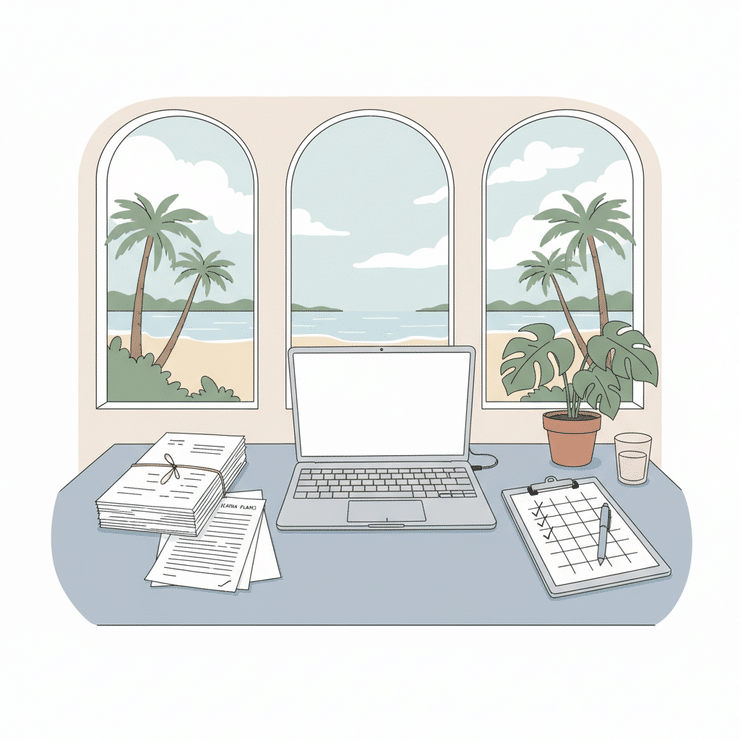
Next Steps You Can Take Right Now
- Map out EVERY housing authority near you. Don’t just check the big city one—hit the small towns too. Use search phrases like “[your county] housing authority” and “Section 8 waitlist Florida.” Yes, most of their sites look like they were built in 2003. Doesn’t matter—dig for their “waitlist” or “apply” pages. Some lists are open for five minutes and then slammed shut for years, so you want to know all your options by tonight. Don’t trust outdated lists you see on random blogs—Google “[your county] housing authority” if you have to.
- Gather every document they could possibly ask for and scan them as PDFs. Birth certificates, Social Security cards, IDs, proof of income, past leases, food stamp letters—everything. If a site won’t let you upload, you’ll need them for in-person or snail mail. Do NOT wait until the application drops to start hunting for paperwork; that’s how you miss your shot.
- Set up a tracking spreadsheet (Google Sheets, whatever works). Make columns for: housing authority name, contact info, last time you checked, waitlist status, next check-in date, and any weird rules. This is your Bible now. Don’t trust your memory—these lists close and open with zero warning.
- Join at least three local housing Facebook groups before you crash tonight. Search “[your city] housing help,” “Section 8 Florida,” and “affordable housing [your county].” People spill real-time info there about which lists just opened or who’s actually handing out paper applications. That’s how you find out before the official sites update.
- Write your “status check” script now. Something like: “Hi, I’m checking if your Section 8 waitlist is open and how to apply. Can you tell me when it last opened and if you expect it to open soon?” Then, put a reminder on your phone: call every 30 days, zero exceptions. If you skip a month, you might miss your window for another year (or five).
Don’t Wait for a Perfect Moment
The truth nobody tells you: there is no perfect moment to start this. The system is not waiting for you to “get your life together.” Every day you wait is another day stuck in limbo while the line gets longer. Even if you feel like a mess, just start. You can fix the rest while you’re on the list. The sooner you get in, the sooner you move up. If you wait, you’re just setting yourself back—no sugarcoating it.
Remember: You’re Not Alone
Thousands of people in Florida are clawing through this same broken mess every single day. The system sucks, yes, but now you know what actually works, and that puts you ahead of most. Don’t let the frustration eat you alive—use it to fuel this hustle. Take these steps, keep moving, and flip the script: make the system work for you, not the other way around.